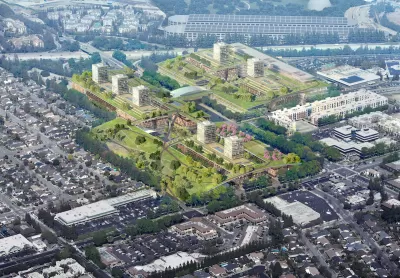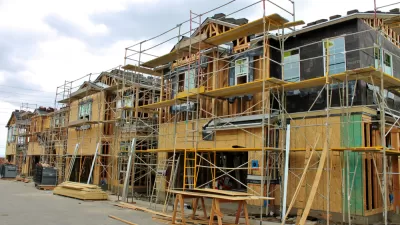A new state law meant to overcome local barriers to development is having its first big test run in Cupertino, California.

"In a critical test of a controversial state law intended to fight California’s crippling housing shortage, [the city of Cupertino] is just days from being forced to approve a massive residential, office and retail development that some residents fear will destroy their quality of life," according to an article by Marisa Kendall.
The word "forced" in that passage raises a question about local control, and state legislation by the name of SB 35 is the answer in the form of state preemption. "[U]nder SB 35, the developer that bought the rundown Vallco Mall holds most of the cards — and appears likely to build more than 2,000 badly needed homes on the site, whether the community likes it or not."
As described in a Planetizen post from earlier this year, SB 35, authored by State Senator Scott Weiner and approved in 2017, streamlines approvals for projects including affordable housing and meeting other requirements like union labor for construction.
Sand Hill Property Company plans to add some 2,402 residential units, 400,000 square feet of retail space, and 1.81 million square feet of office to the Vallco Mall property.
The political drama is still playing out in Cupertino, reports Kendall. "Developers, academics and advocates throughout the Bay Area and beyond are rapt as they watch the confrontation that has turned Cupertino into a microcosm of the forces at play in the housing crisis — and a potential precursor for development battles across the state." An organization called Better Cupertino is fighting the project, and could sue when/if the plan is approved by the city.
FULL STORY: Battle heats up over trailblazing Silicon Valley housing development

Alabama: Trump Terminates Settlements for Black Communities Harmed By Raw Sewage
Trump deemed the landmark civil rights agreement “illegal DEI and environmental justice policy.”

Study: Maui’s Plan to Convert Vacation Rentals to Long-Term Housing Could Cause Nearly $1 Billion Economic Loss
The plan would reduce visitor accommodation by 25% resulting in 1,900 jobs lost.

Why Should We Subsidize Public Transportation?
Many public transit agencies face financial stress due to rising costs, declining fare revenue, and declining subsidies. Transit advocates must provide a strong business case for increasing public transit funding.

Paris Bike Boom Leads to Steep Drop in Air Pollution
The French city’s air quality has improved dramatically in the past 20 years, coinciding with a growth in cycling.

Why Housing Costs More to Build in California Than in Texas
Hard costs like labor and materials combined with ‘soft’ costs such as permitting make building in the San Francisco Bay Area almost three times as costly as in Texas cities.

San Diego County Sees a Rise in Urban Coyotes
San Diego County experiences a rise in urban coyotes, as sightings become prevalent throughout its urban neighbourhoods and surrounding areas.
Urban Design for Planners 1: Software Tools
This six-course series explores essential urban design concepts using open source software and equips planners with the tools they need to participate fully in the urban design process.
Planning for Universal Design
Learn the tools for implementing Universal Design in planning regulations.
Smith Gee Studio
Alamo Area Metropolitan Planning Organization
City of Santa Clarita
Institute for Housing and Urban Development Studies (IHS)
City of Grandview
Harvard GSD Executive Education
Toledo-Lucas County Plan Commissions
Salt Lake City
NYU Wagner Graduate School of Public Service





























